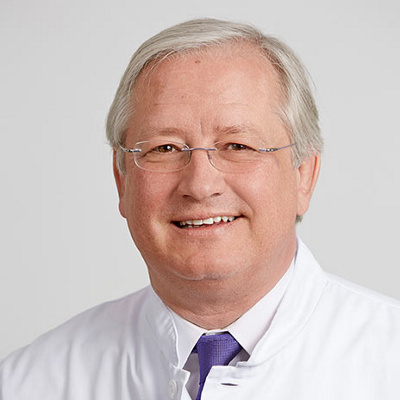Hirslanden Precise - Most important information
PDF | 624.07 KB


A genetic predisposition is a contributing factor in the development and progression of many diseases. At Hirslanden Precise, our centre of excellence for genetic medicine, we examine the individual genetic predispositions of our patients. This allows us to provide more precise diagnoses and more effective prevention and treatment options in many medical specialities.
Genetic tests are carried out in this area if someone is already sick and the disease is believed to be genetic in nature. The aim is to identify or exclude the genetic causes, to enable a reliable diagnosis and to support appropriate therapy. We focus in particular on common diseases such as cardiovascular disease or cancer.
Aside from the diagnosis and treatment of diseases, genetic analyses can potentially help to improve patients' well-being. For example, they can provide information on how personal performance or eating habits can be optimised. Patients with a genetic variant can thus plan their life better and deal with their disease. As soon as a clear relationship between the genetic findings and lifestyle has been proven, we will include this area in our offer.
Together with the expert, you will discuss your individual family history. Based on this, you will jointly define the genetic analysis that is right for you. Genetic analyses are already part of the medical treatment guidelines in various areas (e.g. breast cancer and prostate cancer). This means that they are included as standard in the treatment.
The expert will inform you about your rights (e.g. right to know or not to know the results). Finally, we take your blood for genetic analysis.
You will receive an appointment for an initial consultation and family tree analysis within 2-4 weeks.
Hirslanden Precise has its own laboratory in Zollikon (ZH). This guarantees fast and easy-to-understand test results. The methods used by Hirslanden Precise are safe and reliable and in line with the latest technological and medical standards. Safety and the protection of privacy have the highest priority.
The expert will explain the results to you and categorise them in your overall treatment process. Together with your treating doctor, you will discuss suitable prevention and/or treatment options.

Here you will find the answers to frequently asked questions about personalised medicine. Who should have a genetic test? What are the advantages of genetic analysis? What is particularly important in a genetic test? If you have any further questions, please do not hesitate to contact us for professional genetic counselling. Contact us.
In genetic testing, specialists look at a person’s genetic material, i.e. DNA. For this purpose, a blood sample is taken from the person. In a specialised laboratory, the DNA is extracted from the blood and examined. The information stored in the DNA as a sequence of letters is then compared with a “reference DNA” and any deviations, so-called variants, are recorded. Genetic specialists then check whether the genetic changes found can impact the health of the person examined. If so, and wherever possible, preventive measures or individual treatments are then initiated. Since the measures are based on the individual genetic disposition, one also speaks of “precision medicine”.
In the following cases, it may make sense to carry out genetic testing. However, decisions are always made on a case-by-case basis:
Complementary to traditional approaches to medicine, genetic medicine deals with the individual genetic preconditions of a person and tailors medical treatment accordingly.
In diagnostics, genetic medicine offers the advantage of detecting risks for diseases before they break out. Thus, early preventive measures can help to avoid a disease in the best case, or at least delay its onset. In treatment, the advantage offered by genetic medicine is that therapies and medicines that show no effect or major side effects based on personal genetic disposition can be avoided from the outset and replaced by effective therapies. This reflects a move away from the watering can principle – and towards precision medicine.
Clear questioning is essential for genetic testing. A doctor needs to know exactly what he or she is looking for and always assess the genetic findings in the context of a patient's symptoms. There are various ways of doing this. In addition, every genetic test must be accompanied by genetic counselling.
The extent to which genes influence the occurrence and course of a disease has not yet been clarified for all diseases. To date, more than 300,000 genetic changes that can have an influence on health have been identified – and new findings are added every year. In the meantime, the hereditary nature of cardiovascular diseases (including high blood pressure) and cancers (BRCA1 and BRCA2 mutations in the area of breast, ovarian and prostate cancer), but also of rarer diseases such as mucoviscidosis (cystic fibrosis), various muscular and metabolic diseases, etc., has been particularly well documented.
The more genes are examined, the greater the probability of encountering an unknown gene variant that has not yet been described. In this case, it is referred to as a variant of unclear clinical significance. We then use different software and tools to try and find out whether it is more of a benign variant or a disease-causing variant. If the finding remains unclear, we recommend re-evaluating it in one to two years, as new findings are constantly being made.
The more genes you investigate, the greater the probability that you will find a pathogenic variant that is not related to the primary clinical question. However, in this case, patients always have the right not to know.
Genetic analyses are covered by compulsory health insurance, provided they are classified as mandatory. According to Article 25, Paragraph 1 KVG, they must be used to diagnose or treat a disease and its consequences. Genetic counselling, like any other medical service, is billed via Tarmed. The tariff for the position «Genetic counselling» corresponds to the basic tariff for a general medical consultation.
The procedure of a genetic test is very easy for patients. In this context, individual advice on genetic counselling before and after a genetic test is very important. In this way, we ensure that mere laboratory analysis does not leads to false conclusions.
Yes, because the legal basis alone, which we always use as a guide, is very strict in Switzerland. The aim of the HGTA is to prevent misuse of genetic testing or data and to ensure the quality of genetic testing. The focus is always on every person's right to self-determination. The right to know and not to know is of great importance. The protection of people incapable of judgement – including children – is also extensively regulated. For example, genetic tests may only be carried out on children if the child's health is acutely affected. The situation is different, for example, in the case of hereditary diseases that can only occur in adulthood. ln this case, parents are not allowed to order a genetic test as a precautionary measure to assess the risk. This is only possible when the child becomes capable of judgement and can therefore give his or her own consent.
Our Hirslanden Precise team consists of internationally recognised experts in genetic medicine. Based on their expertise and the close collaboration with the referring physician where applicable, we provide holistic, empathetic care and advice to our patients in the field of precision medicine. The genetic analyses are carried out in our own Precise Laboratory using the latest genome sequencing technologies. The analyses are then interpreted by our genetic experts and our team of experienced scientists.


The Precise Genetic Promoters are doctors with a particularly strong interest in genetic medicine. They have received further training from the Hirslanden Precise experts in specific workshops and offer genetic counselling in their respective specialties accordingly, while remaining in close contact with the Precise medical directors Prof. Gallati and Prof. Szucs. In addition, the Genetic Promoters are also ambassadors for Precise Medicine in their respective clinics.
On our "Infohub for Genetic Promoters" you will find information, consultation documents and further training materials on genomic medicine, as well as information on the range of services offered by Hirslanden Precise. Write us a short message to get the login data.